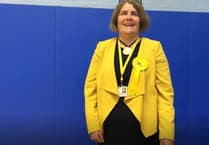LOCAL people must be involved in the reshaping of local government in Surrey, say Woking Liberal Democrats.
Surrey County Council’s proposals for one unitary authority to govern the county, scrapping 11 borough and district councils, has sparked alarm.
As leaders of the threatened authorities co-operate to form alternatives for simplifying local government, the Lib Dems want Woking residents involved in the reforms.
“We are concerned that residents should not be forgotten in this battle for control of local democracy,” said the council’s Lib Dem leader, Cllr Ann-Marie Barker. “Reports on the future of Woking should be shared with local people and the public’s views on new ways of delivering local democracy must be heard.”
In July, county council leader Tim Oliver wrote to the Government outlining his support for what would be the biggest unitary authority in the country, overseeing most municipal services for 1.2 million people. His approach preceded a white paper on local government reform, Recovery and Devolution, due to be published in the autumn.
“Now, Woking and other local councils in Surrey are looking at alternatives to Mr Oliver’s plans,” said Cllr Barker. “Surrey came up with a plan while the rest of us were busy battling a pandemic. They didn’t ask local people.
“Liberal Democrats do not want local people forgotten in all of this. All reports on Woking commissioned by local authorities, and funded by council taxpayers, must be shared with the public.”
Woking Lib Dems are asking residents for the views on unitary authorities and how they would divide up the county to save money and deliver services more efficiently, while maintaining local democracy. Suggestions can be emailed to [email protected].
SCC commissioned consultants PWC to produce a report showing abolishing district and borough councils would save around £135million a year in costs, which could be invested in services such as housing.
However, these savings are disputed by Residents Against Surrey Single Unitary (RASSU).
“These are not ‘actual’ figures, rather PWC have used an algorithm for a theoretical ‘mid-sized County’ and this is how the headline figure has been calculated,” said RASSU’s Hannah Dalton. “I think anyone with a child who has just received their A-level or GCSE results will know the impact of an algorithm and have little faith in the result.
“We urge people to find out more about our campaign at www.RASSU.org.uk.”
The county council has cancelled the special meeting it was to hold on 29 September to debate the local authority structure in the county. As the Government’s white paper is to be published later than expected in the autumn, the “business case” for a unitary authority will now be on the agenda for the council’s meeting on 13 October.




.jpeg?width=209&height=140&crop=209:145,smart&quality=75)